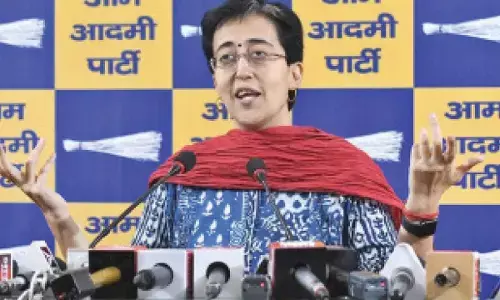Indian Govt inaction responsible for air pollution

Delhi has been ranked as the most polluted metropolitan city in the world 14 out of the 20 most polluted metro areas of the world are located in India Recently, during the cricket match between India and Sri Lanka, Chief Minister of West Bengal Mamta Banerjee said that she was ashamed at seeing Sri Lanka cricketers in pollution masks
Delhi has been ranked as the most polluted metropolitan city in the world. 14 out of the 20 most polluted metro areas of the world are located in India. Recently, during the cricket match between India and Sri Lanka, Chief Minister of West Bengal Mamta Banerjee said that she was ashamed at seeing Sri Lanka cricketers in pollution masks.
Expressing the same concern, Congress president Rahul Gandhi said we needed collective steps for reducing pollution levels in Delhi. Prime Minister Narendra Modi too appears concerned. However, speaking to the State Environment Ministers, he said the rising air pollution levels were due to the changing lifestyles brought about the India’s economic development.
The use of high levels of electricity in, for example, air-conditioners, leads to more demand for electricity and more air pollution in generation of the same. In Modi’s view, the people themselves are responsible for creating the pollution by seeking high levels of consumption.
Let us start from the beginning. Why do we need to control air pollution? Air pollution reduces the life expectancy of the people. A reduction is air-pollution leads to lesser diseases and less expenditures on health care.
It increases the life expectancy, leads to a longer work life and higher standard of living. The benefits can be calculated by asking the people how much money they would be willing to pay for an addition year of life expectancy. The benefits from control of pollution can be assessed by multiplying the number of people by the amount they would be willing to pay.
On the other hand, the control of air pollution requires certain expenditures in the installation of pollution control equipment. A number of studies show that the economic benefits from increase the life expectancy are much greater than the costs of installing the pollution control equipment.
The Bill and Melinda Gates Foundation studied the benefits and costs of introducing Flue Gas Desulphurization (FGD) technology in eight power plants in India so that the level of pollution was reduced. The study found that the benefits were six times the cost for installing this equipment at Dadri Thermal Power Station and four times the cost for Unchahar Power Station.
A study by the Organisation for Economic Cooperation and Development (OECD) measured the cost and benefits of implementing the Thematic Strategy on Air Pollution in the European Union. The study found that the benefits are about 20 times the cost of implementing the strategy.
A study for Shanghai published in the Journal of Environment Management found that the power plants around the city, if fitted with air pollution control equipment, would provide 5.6 times the cost of installing the pollution control equipment.
Other studies for other parts of the world consistently say that the benefits from control of air pollution are much greater than the cost. These studies indicate that control of pollution is highly beneficial.
The question is when the benefits of the air pollution are greater than the costs, then why the government does not implement measures to control the pollution? The answer to this riddle is given in a study of installation of a pollution control technology known as IZK in the brick kilns around Dhaka undertaken by the Copenhagen Consensus Centre.
The study found that installation of this equipment will impose a cost of 3893 million Taka on the kiln owners; while it will provide a benefit of 4449 million Taka to the people of Dhaka. Taken together, the installation of the equipment would provide a net benefit of 556 million Taka to the society as a whole. However, the benefits would accrue to the people while the costs would be borne by the brick kiln owners.
Therefore, the brick kiln owners do not want to install air pollution control equipment and the people continue to suffer from air pollution. The situation is similar to the naughty child in the family not wanting to mend his ways and the family suffering as a result.
The solution is for the head of the family to force the naughty child to mend his ways and thereby secure the good of the whole family. Similarly, the solution is for the government to force the brick kiln owners to install the pollution control equipment and secure the good of the whole society.
In that case the brick kilns will bear the cost of installing the pollution control equipment. This increase in cost will be reflected in a higher cost of production of the bricks. For example, the cost of a brick may go up from Rs. 8 to Rs. 10 if the Government requires brick kilns in Bangladesh to install IZK technology.
The cost of 3893 Million Taka incurred by the kiln owners will be passed on to the people. There will not be any additional burden on them. At the same time, the people would have to pay more for the bricks and they will be poorer by this amount. However, they will reap health benefits of 4449 million Taka. In the end everyone will be happy.
The brick kiln owners will get reimbursed for the costs incurred by them through higher price of bricks. The people will pay more for the bricks but will reap greater benefits from improved health and life expectancy.
The difficulty is that the people cannot request the kiln owners to install the pollution control equipment. The government alone can do this. The failure of the government to discharge this responsibility is the cause of air pollution.
The problem in India is not of lifestyle as Prime Minister Narendra Modi has said. The problem is that the government is not willing to stand up to the polluters. The result of this inaction is that the people of the country are suffering. If the government forced the polluters to install air pollution control equipment, then the society at large would be much better off.
The explanation given by Modi also does not hold because the cleanest metros of the world are located in Australia, New Zealand, Finland, Canada and Sweden where the lifestyle of the people requires much higher level of consumption of goods and the pollution is commensurately more.
However, those countries have recognized that control of pollution is beneficial for the entire society and have required the installation of the pollution control equipment. The problem is not lifestyle but the failure of the Indian government to tax the polluters for securing the social good.
Author was formerly Professor of Economics at IIM Bengaluru




